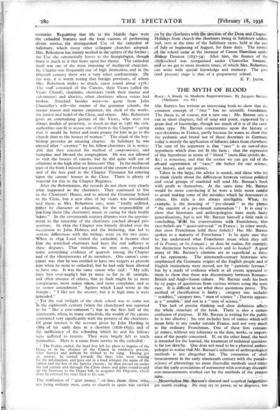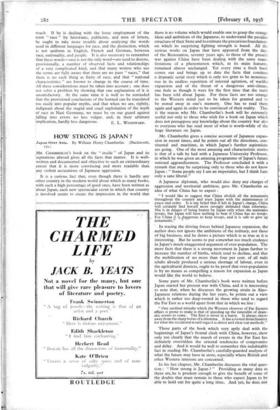THE MYTH OF BLOOD
.Race A -Study in Modern Superstitions. By Jacques Pourzno. (Methuen. los. 6d.)
-MR. BARZUN has written an interesting book :to show that the common concept of " race " has no scientific foundation. The thesis is, of course, not a new one Mr. Barzun sets it out in short chapters, full of snap and point, supported by a great deal of knowledge, -though too much of it is of the card- index type. Mr. Barzun concentrates upon the history of race-doctrines in France, partly because he. wants to show that the pedantic and brutal use of these doctrines in Germany today is'merely the application of fallacies taken from elsewhere. .The sum of his argument is that "race" is an out-of-date hypothesis which does not fit • the_ facts ; that the expression of this hypothesis in terms of !` blood_" (nein..13ha spricht, &c., &c.) is nonsense, and that the sooner we can get rid- 'of the -absurd superstition of "-race," the-better for our science, our history, and our .politics. - Taken in the large,- the advice is sound,: and those who try to think clearly about the differences between various political and social groups of mankind will read Mr. Barzun's-- book -with profit to themselves. At the same time Mr. Barzun -would be more convincing if he were a little - more careful to avoid making some of the mistakes which he denounces in others. His style is . not always intelligible. What; for example, is the meaning of " pre-shrunk " in the pluase "the sanctity of a pre-shrunk nationalism " ? It is easy- to show that historians and anthropologists have made hasty generalisations, but is not Mr. Barzun himself a little rash in 'concluding, 'I ro) his Conversations Witle Frenchmen; -that -race-beliefs are " uasi-universal " in France; in other words; that most Frenchman thOld these beliefs? Has Mr. Barzun spoken to a majority of Frenchmen ? Is he_ quite sure that he has understood what Frenchmen mean when they talk of la France, or. les francaLsi _or does he realise, for example; the distinction between les allemands and les bocher?- A good many Of Mr. Barzim's citations are- as- superficial as those of his opponents. The nineteenth-century historians who emphasised the Germanic origins. of the English people and of English institutions were moved, not by "patriotic fervour,'f but by a study of evidence which at all events appeared to them to show that there was discontinuity between Romano- British and Anglo-Saxon culture. Mr. Barzun ends -his book by 25 pages of quotations from various writers using the term race. It is difficult to see what these quotations prove.", The method of classification is faulty ; category one includes " notables," category .two, "men of science " ; Darwin appears as a "notable," and-not as a "man of science!' 74.-• . This lack of precise thinking and clear, definition sire. cts the whole . structure of the book. There is also a etrAiin confusion of purpose. If Mr. Barzun is writing for-the public he is too allusive ; his text includes lists of names whidh:Will mean little to any reader outside France, and-not very- winch to the ordinary Frenchman. One of these lists contains 31 names, without any reference to the date, works, or import-, once of the people concerned. If, on the other hand, the 'Stook is intended for the learned, the treatment of technical questions is far too sketchy. .Qne does not need to be a physical anthro- pologist to notice tluirldir: Barzun's criticism of anthropological methods is not altogether fair. The connexion of 7.. skull *tneasutement in the early nineteenth century with the pselido- science of phrenology no more discredits methods used !tieday than the early associations of astronomy with-astrology disiit star-measurements worked out by the methods of the present -:.-:Air;e044evt,i5t10.;slaFeavd7inid...scepticaljocliLattiiiits are worth reading.: He may try to prove, or to disprove,-tos
much. If he is dealing with the loose employment of the term " race " by historians, publicists, and men of letters, he ought to take more trouble about analysing the words used in different languages for race, and the distinction, which is not uniform in English, French and German, between 'race, nationality, and people. It is also necessary to remember that these words—race is not the only word—are used to denote, provisionally, a number of observed facts and relationships of a very complicated kind, and that many writers who use the terms are fully aware that there are no pure "races," that there is no such thing as fixity of race, and that "national characteristics" are known to change in the course of time. All these considerations must be taken into account ; one does not solve a problem by showing that one explanation of it is unsatisfactory. At the same time it is well to be reminded that the provisional conclusions of the learned can be translated too easily into popular myths, and that when we are, rightly, indignant about the stupid and cruel exploitation of the myth of race in Nazi Germany, we must be on our guard against ,falling into errors no less vulgar, and, in their ultimate











































 Previous page
Previous page